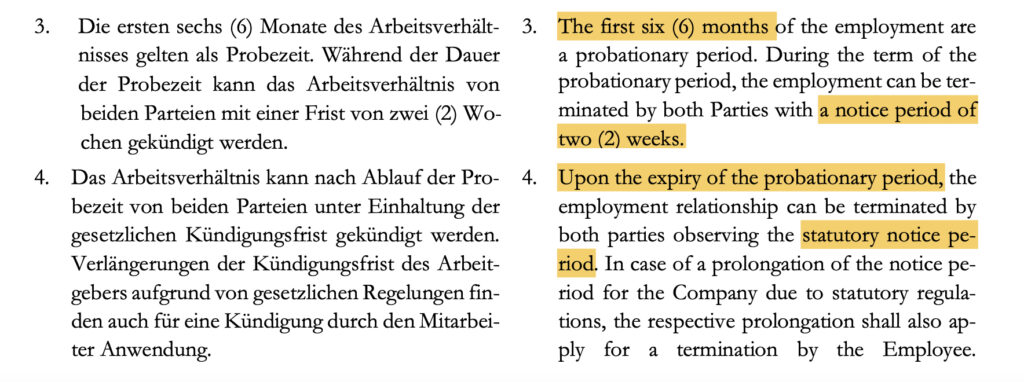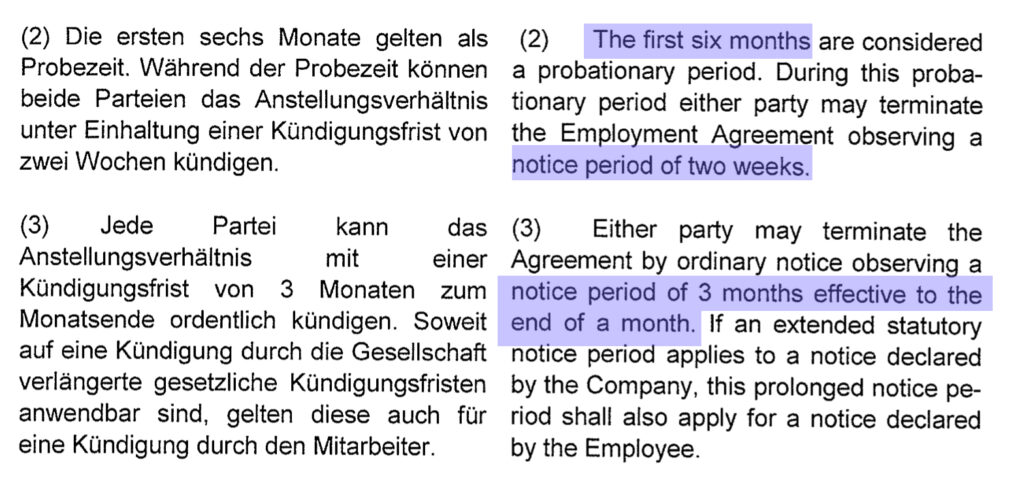In today’s world, it is ok to change jobs to achieve professional and personal growth and a better salary. In this guide, you will learn how to resign in Germany professionally and respectfully, so you don’t burn any bridges with your employer and the Ausländerbehörde.
Read this before you quit your job
If you are a citizen of the EU or the EEA, you can skip this part.
If you are an international in Germany with a temporary residence permit that allows you to work or an EU Blue Card, you have to meet certain conditions before changing your job.
If you have lived in Germany for less than two years, you need the approval of the Immigration Office (Ausländerbehörde) before you can change jobs; since your work permit might be tied to your current employer. If you change jobs without the correct permissions, you could lose your residence permit. If the Immigration Office approves your change, you will need to set an appointment so they may amend your residence permit.
If you have lived in Germany for more than two years, your work permit is likely not tied to your employer anymore, and you can change jobs freely. When it’s time to renew your residence permit, bring your old employment contract and your new employment contract with you.
You should consult your local Immigration Office to verify if you meet all their requirements before changing jobs. Here are some links for the corresponding Ausländerbehörde from the most popular cities in Germany:
7 steps to quit your job in Germany
Before you hand in your resignation letter, be honest with yourself about why you are leaving your current role. Writing the reasons down might help you get the assurance you need that you are making the right decision for you and your career.
You need to be sure of your decision before communicating it with your boss and peers. Now let’s jump into the process of how to resign in Germany.
1. Check your contract for your notice period
The source of truth of how much notice period you need to give is in your employment contract. Every employer requests different notice periods. Some ask for the statutory four weeks; others may request three months or more.
Knowing this notice period is very important. You can only start a new job after your notice period is over.


If your employment contract does not have any clause about a notice period or if it refers to German law, then the statutory period applies. The statutory notice period depends on the amount of time you have been working at the company.
| Employment Length | Statutory Notice Period |
|---|---|
| 0 - 6 months (probation period) | 2 weeks |
| 7 months to 2 years | 4 weeks to the 15th or to the end of the calendar month |
| from 2 years | 1 month to the end of the calendar month |
| from 5 years | 2 months to the end of the calendar month |
2. Check when you should hand in your resignation letter
While reading your employment contract, check the details on when your notice period will start counting. For example, some employment contracts indicate that you should submit your resignation letter to the 15th or to the end of the calendar month.
Here is an example of one of my employment contracts with the sentence: “The employment relationship can be terminated by either party with three months’ notice to the end of a month.“

“To the end of the month” means that if you hand in your resignation letter on the 1st, your notice period will not start counting until the end of that month.
For example, if you present your resignation letter on the 1st of April, your notice period will only start on the 1st of May. Versus, if you would have submitted your resignation letter on the 31st of March (latest), then your notice period would start counting on the 1st of April.
The same principle applies to the concept of ‘to the 15th of the calendar month‘. So, for example, if you present your resignation letter on the 16th of April, your notice period will only start counting on the 15th of May. But, on the other hand, if you submit it on the 14th of April (latest), your notice period would start on the 15th of April.
Your resignation only becomes effective, once your employer receives your hand-signed letter. So in case you need to send it via postal mail, take those shipping days into consideration as well.
3. Write your termination letter
Your German employer will expect you to write your resignation letter in a certain way. We have written a complete guide that you can follow so you can write a professional resignation letter in Germany.
Remember to ask for a reference letter (Arbeitszeugnis) and a holiday certificate (Urlaubsbescheinigung) in your termination letter.
Read Our Related Guide
4. Check how many vacation days you have left
When you quit a job in Germany and have vacation days left, you are in luck because you will be able to take them before you leave your employer. The number of vacation days you have left will depend on the length of time you have worked with your employer and what time of the year you resign. You can find more details in our guide about vacation days in Germany.
It is important for you to know how many vacation days you will need to take during your notice period to plan your handover correctly with your team and supervisor.
Read Our Related Guide
5. Schedule an appointment with your supervisor
It is always best to resign from your job in person; this shows respect and professionalism. If you have a remote job, you can also quit in person by scheduling a video call with your supervisor.
Here is an example of an agenda for your meeting with your supervisor:
5.1 Say that you are quitting your job
You want to be honest with your employer about your reasons for changing jobs. Try to keep your reasons positive. Mention a few things you have learned in your current role and focus on what excites you about your new role. Avoid talking negatively about your experience in your current role and list all the small things that have upset you.
5.2 Hand In Your Resignation Letter
If you have your meeting in person, now is the time to hand in your resignation letter and ask your supervisor to sign a copy to acknowledge receipt.
If you are having a video call with your supervisor, you should ask to whom you should send the letter by postal mail.
Remember, the notice period only starts counting when your employer has received your resignation letter in writing via postal mail or in-person and on the correct date (as explained in point 2 of this guide).
5.3 Announce Your Resignation To Your Team
It’s a good idea to ask your supervisor how and when they would like to announce your resignation. For example, it might be that your supervisor might have a meeting in mind when the announcement can take place.
If your supervisor gives you the green light to announce your resignation as you see fit, then try to do so in team meetings. Try to announce it as soon as possible so your team can prepare for your departure.
5.5 Discuss handover of projects
If you are an owner of any project, you should talk to your supervisor about who your replacement should be; this allows your supervisor enough time to think about how to assign new responsibilities to other team members.
5.6 Talk About Remaining Vacation Days
If your supervisor does not ask, this might be a good time to discuss your remaining vacation days and the best plan to take them. Additionally, your supervisor will have a more precise date of when your actual last day at work will be.
Leave this point last, as you don’t want to portray to your employer that your main goal is to leave the company as soon as possible, even though that is how you might feel.
6. Complete your notice period
It is important that you remain motivated, respectful, and helpful during the remainder of your work contract. Having a good attitude will leave a positive last impression on your employer.
Here are a few tips on how you can prepare for your last weeks at work:
- Plan your remaining vacation days: check with your team members and supervisor if your planned dates are ok with them.
- Don’t leave open tasks: make sure you finish any open tasks or projects before your last day of work.
- Prepare the handover of projects: ask your supervisor who will take over your projects so you can schedule some time to do a proper handover. If no one can take over your projects, then make sure to document any important processes, so the next person that takes it over has some guidance on what to do.
- Clean your hardware (if applicable): If you received a work laptop or mobile device, return them clean from the outside and the inside. Remove any stickers and log out of any personal accounts you might have used, such as an Apple or Google app store ID.
- Complete the exit interview (if applicable): Some companies might ask you to have an exit interview before your last day. Sometimes, an HR employee interviews you; other times, they send a form for you to fill out. Take the time to answer your employer’s questions truthfully and professionally. Remember to give constructive feedback and not just complain about what you were unhappy with.
7. Prepare for your last day at work
On your last day at work, remember to bring all the things you need to return to your employer. For example, your laptop and mobile device with charging cables, employee badge, access cards, or locker keys.
Also, bring a backpack or bag to pack your things from your desk. If you have a good relationship with your team, you can even bring a cake or some sweets for this day or invite them for a few beers after work.
Remember to ask your supervisor when you will receive your reference letter (Arbeitszeugnis) and a holiday certificate (Urlaubsbescheinigung). Depending on the company’s bureaucracy, your supervisor might have these documents ready on your last day of work, or the company will send them by postal mail a few days or weeks later.
Final thoughts
Make sure all your ducks are in order before you quit your job. For example, if you are an international worker with a temporary work permit and you want to stay in Germany, verify with your local Immigration Office the process for changing jobs successfully without losing your residence permit.
If you are looking for a new job, make sure to check our section on working in Germany where you will find helpful guides on how to create your CV and cover letter to impress Germans and tips on how to find a job.
If you don’t have a new job in line and would like to stay in Germany, you can also check our guide to find out what unemployment benefits in Germany you could be eligible for.
Remember to continue working with motivation, respect, and positivity until your last day at work. Leaving a good impression with your employer might go a long way. You never know when you will meet people again.





